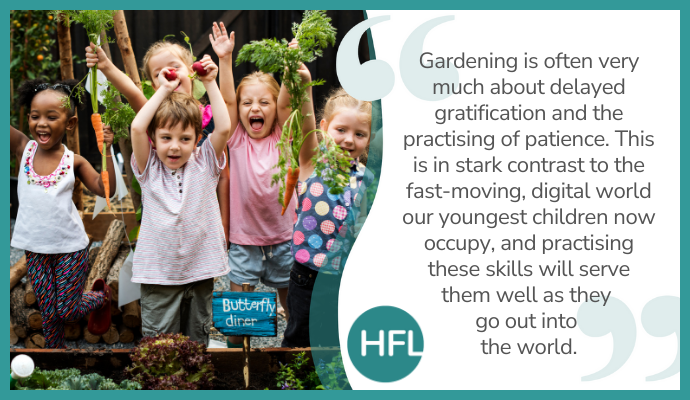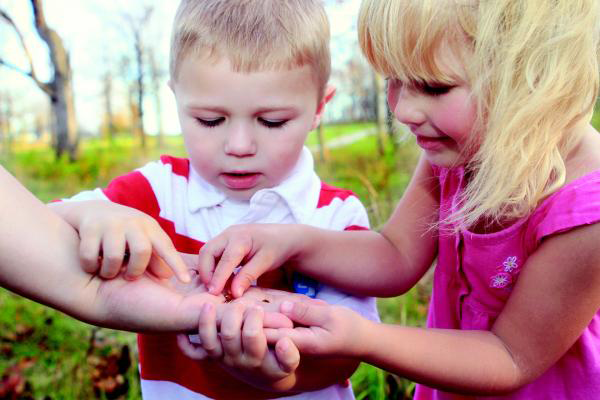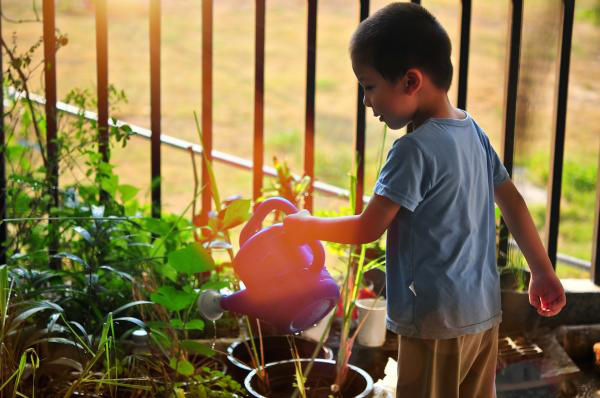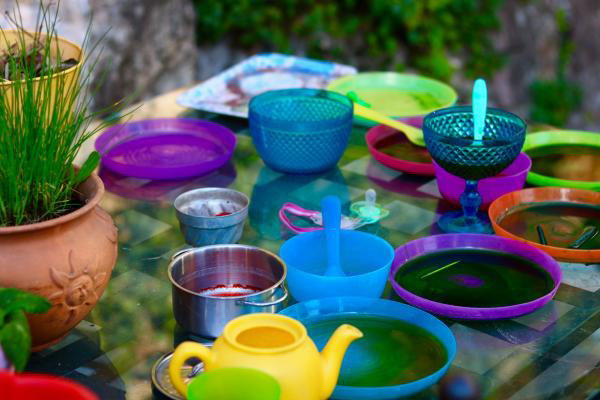
My own memories
I am very much aware of my own privilege when I think back to my earliest memories of being outside in the garden and growing up in Derbyshire. From shelling fresh peas on the back step, summers spent collecting wild elderflowers and standing on a chair in the kitchen to help my grandma make her elderflower wine in huge glass demi-john bottles, collecting lavender and rose petals to make my own ‘perfume’, and feeding garden birds through the winter with seeds and dried fruits mushed up into leftover fat from the kitchen, I loved how being outside made me feel, and even in the colder months I was always to be found outside, in my anorak, digging around in the soil with a stick.
One of my earliest school recollections of learning about the natural world was the class ‘nature table’. I remember bringing in an abandoned birds’ nest to display and talk about, and I also, rather embarrassingly, remember my teacher explaining carefully and sensitively to me, aged seven, why she’d prefer it if I did not pick wildflowers for her on my way to school. We would go outside and spend time watching and naming birds, trees, and flowers. Through being outside in all weathers I quickly learned about the changing seasons and how these influenced the garden calendar. I was aware of which vegetables and fruits were harvested in which season and why. I thank my early teachers and family for this natural education, and I have tried (not always successfully) to replicate it for my own children.

Why gardening?
Even now, several decades later, tending to my own small London back garden is where I feel happy, less anxious, and more able to relax, the sense of satisfaction of having aching limbs and dirty fingernails from a day spent weeding, planting, and pruning is like no other. I am not claiming to be a good gardener, far from it, but I like and appreciate creating a colourful, attractive space which attracts bees and butterflies. I gain satisfaction from picking figs, tomatoes, chilli peppers and herbs that I have had some hand in growing. Gardening, I have realised, slows you down. It is something that you can do when you’re feeling angry, sad, or anxious. Every action you perform in the garden is almost like some pronouncement that something good will follow on, an act of huge trust in the future, and I like that.
During the 28 years I have spent working with young children, many of whom have often had no access to a garden, or even a balcony, it has always been vitally important to me to try and offer gardening experiences that spark an initial flame of interest in growing and caring for plants, understanding where we get our food from and hopefully start a lifelong interest in looking after and caring for our natural world. I have never doubted for a minute, the positive effect of being outside as part of normal daily practice, has on our children’s mental health and their ability to self-regulate. Children find joy in the smallest things and anyone who has ever witnessed a child discover a family of woodlice under a log, observe rain drops on an intricate spider’s web or taste their first cherry tomato that they grew from seed will understand how ‘real’ and ‘in the moment’ these experiences are. Such experiences cannot be replicated with a book or a film but must be nurtured and enabled by us, as practitioners.
Gardening is often very much about delayed gratification and the practising of patience. This is in stark contrast to the fast-moving, digital world our youngest children now occupy, and practising these skills will serve them well as they go out into the world. Of course, there are many other skills children will practise in the EYFS garden; scientific cognitive skills such as observation, prediction, and comparison to name but a few. Physical, perceptual, and motor skills will be developed by manipulating tools to dig, pour, plant, and weed, as well as sensory awareness skills developing through the exploration of different scents and textures.
Many of us will have seen the joy and high levels of engagement that children demonstrate during their weekly or fortnightly ‘Forest school’ sessions if this is part of their curriculum offer. I’ve also noticed the rich language opportunities that such sessions provide and the ambitious vocabulary that is taught and contextualised during this time. The daily tending of plants and observing wildlife in the garden has very much the same impact. I have seen children, including those with English as an additional language or with speech and language expressive delay, quickly learn a range of new nouns for plants, insects, birds, trees, fruits, and vegetables. They are able to pose questions and seek answers from adults who may skilfully encourage them to find the answer through further exploration or by referencing nonfiction texts. Opportunities to enhance the early reading offer are also in abundance in the garden; seed packets and signs for different plants, spotter sheets in the tarpaulin covered ‘bird hide’ with the binoculars, authentic environmental print burnt into tree slices to label the raised beds, the bug hotel, and the vegetable plot for example.

Points for consideration
Not everything goes smoothly and to plan all the time, and I always think that is part of the beauty of working in the EYFS, I remember children being upset when their runner beans were eaten by caterpillars and their spring bulbs dug up by a tenacious squirrel. All these opportunities provide starting points for further discussion and of course opportunities for children to problem solve and think critically. Below are some of the things I have learnt along the way about my experiences of sharing my love of gardening with our youngest children:
- don’t over plan or impose your own interests too much! I have made the mistake of assuming that children will love an activity I have planned, but often children will have better ideas or will follow a line of inquiry I had not even considered
- following on from the previous point, consider carefully the learning opportunities that may or may not be offered by activities that you set up for children. Sticks and acorns brought in by the teacher for example, would be no replacement for children going out to explore whole trees in all their glory
- hand over ownership of the investigation station, curiosity cube or good old fashioned nature table to the children more. Provide them with clear pots and trays to display items that are of interest to them and cards for their captions and labels to be scribed or written by them
- maximise the use of the whole school site and local area. Some schools and settings’ outdoor areas might lend themselves to a garden area being developed more than others but there might be a hidden corner somewhere else on site that would be ideal
- involve families; explain what you want to provide for children and why. In the past I have been able to recruit regular, green-fingered volunteers to work on setting up the environment or support children in the garden. I’ve also had donations of seeds, bulbs, cuttings, and plant pots from lovely families who really appreciate what we have been trying to do and wanted to help
- work with local businesses. I’m always amazed by what I’ve managed to get for free from generous community partners. It’s always worth a friendly phone call, social media request or email to local supermarkets and garden centres. I have received a huge bag of bark chippings, compost, end of season plants and old sleepers to create raised beds this way

National Gardening week 2023
National Gardening week 2023 is held between 1st and 7th of May this year. It is an event planned to celebrate and raise awareness of the difference that gardens and gardening can make to the lives of everyone in the UK. It hopes to ‘inspire more people, particularly the next generation of gardeners, to experience the joy of growing and creating beautiful green spaces.’
If you are in the early stages of developing a gardening offer for your children, this weeklong celebration seems like the perfect time to launch your project and drum up some support and excitement in your team and with your families. More information about this event can be found on the RHS website (Royal Horticultural Society).
I hope this blog has perhaps inspired you to develop your gardening offer further and I wish you all a joyous spring and summer in the garden with your children.



